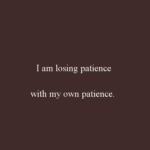 Losing My Patience
Losing My Patience
by Michelle Byrne, University of Akron
My students wonder why writing is “so hard.”
My students just want me to tell them “how to do it.”
They ask me to help them brainstorm, and they wonder if they are “doing it right.”
In years past, I am usually patient with them. College level work is new, and it’s not just my class they are taking. They had years and years of people prescribing for them what to do: Opening paragraphs should summarize. Three main points. Summarize (again) and restate the thesis. The essays I am asking them to write bend or break all these rules, and this makes them uncomfortable. They are not sure what will happen if they don’t follow the “rules”. Maybe they will get kicked out for accidentally plagiarizing. Maybe the paper will count for 50% of their grade and they will fail the course.
Maybe their teacher doesn’t even care about them. They’ve been told college professors don’t care.
I always care.
This year, though, my patience is thinning. I don’t think it’s burn-out. I don’t feel that I am out of ideas or lack of energy. I am doing some new things that make the class exciting, and I’m sticking with some well-tested strategies that I will probably keep using until they just don’t work anymore.
So it’s not burn-out.
Perhaps the opposite… This year, the weight of what we are trying to do–have them read and analyze a text, have them think critically about the information, have them check the validity of a source, have them empathize with another point of view, have them choose their words carefully and consider their impact–seems more important than ever. This year especially, when I am teaching, I feel the weight of where our country is and where we seem to be headed hanging over everything we do. I worry that bringing the full force of that into the classroom will be counter-productive, but I also worry that avoiding it mutes the urgency to address these problems.
Certainly, I was feeling this before our recent TYCA conference in St. Louis. I read the news. I watched as the Black Lives Matter movement worked hard to cut through the noise to be a voice for justice, only to be labeled by some a hate group despite the fact its leaders denounce violence and violent rhetoric. I see Native Americans fighting (again) to protect their sacred land. I hear the rhetoric of election politics adding to all the division and disturbance. I’m at a loss for how to handle it some days, and believe, more than ever, that I need to be better at my job than I am.
I’m sure many of my fellow instructors feel similar pressures.
At TYCA this year, I felt a strong sense of relief from coming together with colleagues who think about these issues, too, from being in session after session devoted to understanding our students, motivating them, incorporating issues of the day, and finding empathy for their lives.
Listening to Stefan Bradley claim that he’s not known for his protesting but then answered the early morning call to go be with his students in Ferguson made me think that sometimes we don’t know what we have signed up for, but we are committed and we have to go. Listening to him affirm the importance of language and the work we do made me think of all my writing teachers who taught me the power in the craft of writing. I thought how lucky his students are to have him.
Indeed, I thought that about all the teachers present that day, all coming together for the goal of becoming better teachers.
We come together and say, “Teaching is hard.”
We ask each other how we do it.
We wonder aloud together if we are doing it right.
We fear the risk.
But more, it seems, we fear taking no risk at all.
Going back to my classroom after the conference, I felt better. I finished grading a set of essays that showed clear improvement in their writing. We would begin a unit on free speech and why we talk about social justice in the classroom, and (most of) the students are eager to write about what they think.
This is always what TYCA does for me. Whatever space I am in, whatever problem I seem to be facing, the conference has a way of speaking to that. Next year, our theme is “Cultivating Creativity.” I believe, given what we have been through this year, this is a question we will all be thinking a great deal about. I’m looking forward to it already.
Speak Your Mind